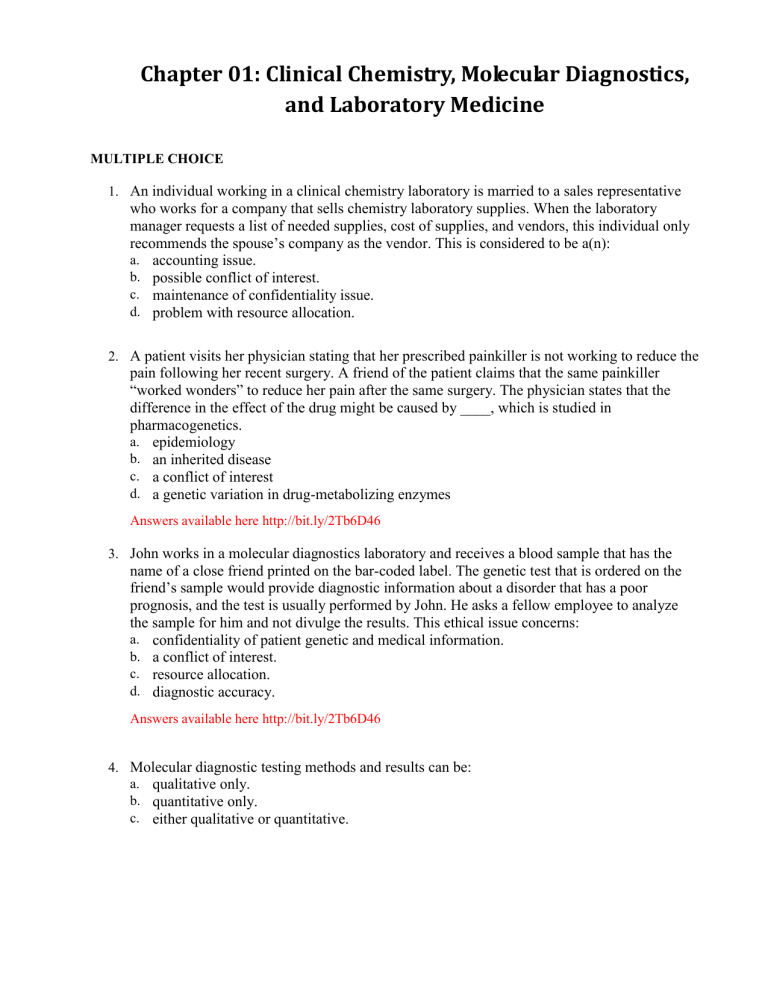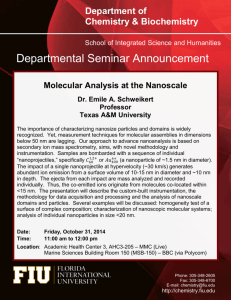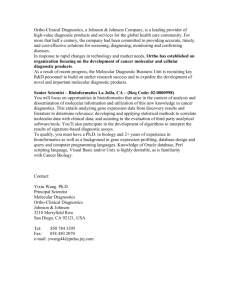Chapter 01: Clinical Chemistry, Molecular Diagnostics, and Laboratory Medicine. All Answers
advertisement

Chapter 01: Clinical Chemistry, Molecular Diagnostics, and Laboratory Medicine MULTIPLE CHOICE 1. An individual working in a clinical chemistry laboratory is married to a sales representative who works for a company that sells chemistry laboratory supplies. When the laboratory manager requests a list of needed supplies, cost of supplies, and vendors, this individual only recommends the spouse’s company as the vendor. This is considered to be a(n): a. accounting issue. b. possible conflict of interest. c. maintenance of confidentiality issue. d. problem with resource allocation. 2. A patient visits her physician stating that her prescribed painkiller is not working to reduce the pain following her recent surgery. A friend of the patient claims that the same painkiller “worked wonders” to reduce her pain after the same surgery. The physician states that the difference in the effect of the drug might be caused by ____, which is studied in pharmacogenetics. a. epidemiology b. an inherited disease c. a conflict of interest d. a genetic variation in drug-metabolizing enzymes Answers available here http://bit.ly/2Tb6D46 3. John works in a molecular diagnostics laboratory and receives a blood sample that has the name of a close friend printed on the bar-coded label. The genetic test that is ordered on the friend’s sample would provide diagnostic information about a disorder that has a poor prognosis, and the test is usually performed by John. He asks a fellow employee to analyze the sample for him and not divulge the results. This ethical issue concerns: a. confidentiality of patient genetic and medical information. b. a conflict of interest. c. resource allocation. d. diagnostic accuracy. Answers available here http://bit.ly/2Tb6D46 4. Molecular diagnostic testing methods and results can be: a. qualitative only. b. quantitative only. c. either qualitative or quantitative. 5. Clinical epidemiology, which is the study of the patterns, causes, and effects of health and disease in certain populations, has provided the clinical laboratory with methods that evaluate the effects and outcomes of laboratory testing. This allows for a more effective: a. process of determining the cost of the testing methods. b. selection and interpretation of laboratory tests. c. determination of the boundaries between the components of the clinical lab. d. conduct assessment. 6. Analysis of which one of the following by molecular diagnostic methods provides a measure of processes that are ongoing at the time of blood sampling? a. Genetic variation in an individual’s response to a drug b. Circulating plasma nucleic acids c. Malignant lymphomas d. Histocompatibility Answers available here http://bit.ly/2Tb6D46 7. A healthy individual with no clinical signs or symptoms of disease visits his physician for a routine physical examination. Blood samples are collected and sent to the laboratory. The tests requested on the sample are for general laboratory analyses, including a complete blood count, a panel of general chemistry tests (including glucose, protein, cholesterol, and others), and an analysis of urine. This type of testing in laboratory medicine is directed at: a. confirming a clinical suspicion of disease. b. selecting a treatment for disease. c. ruling in a diagnosis. d. screening for disease in the absence of clinical signs or symptoms. 8. The discipline involved in the selection, provision, and interpretation of diagnostic testing that uses primarily samples from patients is: a. clinical chemistry. b. hematology. c. laboratory medicine. d. molecular diagnostics. Answers available here http://bit.ly/2Tb6D46 9. A male laboratorian works in the clinical chemistry laboratory of a large hospital. He is approached by his friend, who is a representative of a drug company, and asked to analyze some patient samples for drug levels of a specific drug that the representative’s company sells and that these patients use. The representative wants to publish a report on the rate of drug absorption and distribution of this drug and tells his laboratorian friend that he will personally reimburse him for his time. What ethical issues come into play here? a. Resource allocation and conflict of interest b. Maintenance of confidentiality and publishing issues c. Maintenance of confidentiality, conflict of interest, and publishing issues. d. Resource allocation, maintenance of confidentiality, conflict of interest, and publishing issues. TRUE/FALSE 1. Molecular diagnostics testing is only used by the clinical chemistry laboratory.




